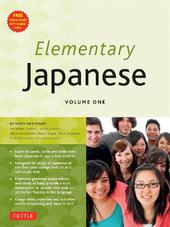
|
Elementary Japanese Volume One: This Beginner Japanese Language Textbook Expertly Teaches Kanji, Hiragana, Katakana, Speaking &
Paperback / softback
Main Details
| Title |
Elementary Japanese Volume One: This Beginner Japanese Language Textbook Expertly Teaches Kanji, Hiragana, Katakana, Speaking &
|
| Authors and Contributors |
By (author) Yoko Hasegawa
|
| Physical Properties |
| Format:Paperback / softback | | Pages:400 | | Dimensions(mm): Height 254,Width 191 |
|
| ISBN/Barcode |
9784805313688
|
| Classifications | Dewey:495.682421 |
|---|
| Audience | |
|---|
| Illustrations |
includes online MP3 audio recordings; b&w illus an
|
|
Publishing Details |
| Publisher |
Tuttle Publishing
|
| Imprint |
Tuttle Publishing
|
| Publication Date |
25 August 2015 |
| Publication Country |
United States
|
Description
This is a comprehensive beginning-level Japanese textbook and language learning program. "Elementary Japanese" is designed for students who are just beginning their study of the Japanese language at the first-year college level or on their own. The author and contributors have created a highly structured approach to learning Japanese based on acquiring the fundamental patterns and constructions of the language as well as the Japanese writing system including the basic Hiragana, Katakana and Kanji characters. Each volume of this two-book set is designed for one semester of study. The books feature detailed grammatical explanations which make them extremely useful as references and for review purposes when traveling to Japan or preparing for the Japanese Language Proficiency Examination (JLPT). MP3 audio recordings are included with each volume on free CDs making this a great way to learn Japanese on your own while ensuring that you learn the correct pronunciation.
Author Biography
Yoko Hasegawa is Associate Professor of Japanese Linguistics in the Department of East Asia Languages and Cultures at the University of California, Berkeley. She currently teaches Japanese linguistics at both the undergraduate and graduate levels and also serves as Coordinator of the university's Japanese language program. She previously taught at the University of Illinois at Urbana-Champaign, and received her Ph.D. in linguistics from Berkeley in 1992.
Reviews"I am self-studying using this book and book two of the series. This book is excellent for the student who is self-studying, because all of the grammar an vocabulary are explained thoroughly. There is very little left up to the student to try to figure out; and though the exercises are designed for use in a classroom, they can be easily adapted. Additionally, this book is all-in-one in that it offers dialogues, cultural notes, grammar, vocabulary, and kanji in one volume. It also comes with a CD that contains the readings, pronunciation of all the vocabulary, and additional exercises." -Goodreads "Elementary Japanese (EJ) has the strong advantage of starting in hiragana. The greetings and usage at the beginning come just at the right time. EJ has clear grammar and usage explanations. The number and pace of the kanji are very good. I like the fact that EJ is fairly cheap & that it doesn't have a workbook. I use some exercises in the book as homework & can add my own things without feeling guilty for not using all of a workbook. The listening comprehension exercises are excellent, and I really like the recordings of the dialogues and the vocabulary. I would suggest giving kanji in the vocabulary lists to help Chinese students of Japanese. The illustrations for the exercises are useful and often funny." --Professor Janet Fair, Loyola University "While these particular Tuttle textbooks are suitable for, and typically used in, classroom settings, including in some of the best universities in North America, they can also serve as an excellent out-of-class reference tool and can very well complement formal language classes or other study materials for the self-learner. From my experience, this series should appeal to a broad range of people, including individuals working on their own, professional people working with a tutor, or students in a classroom setting. I have personally used the Tuttle Elementary and Continuing textbooks both as part of university classes and on my own, and I have been very satisfied with them." --Lingholic blog
|